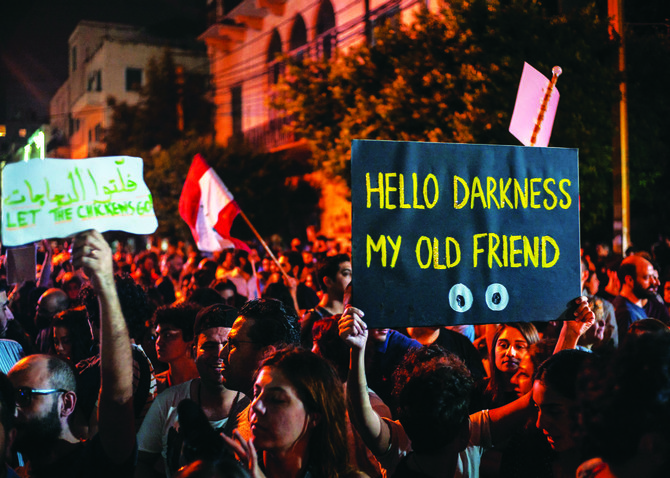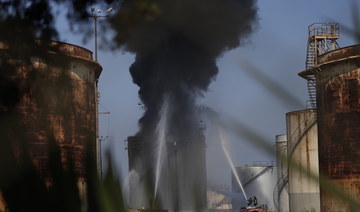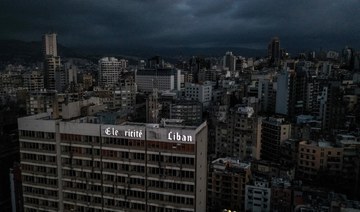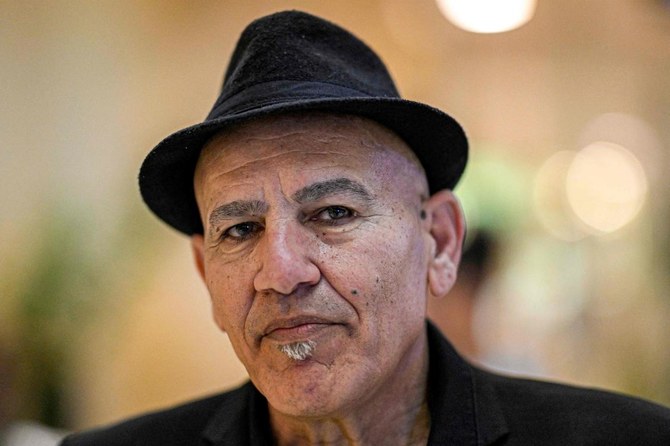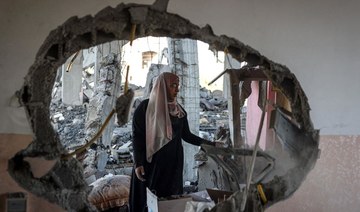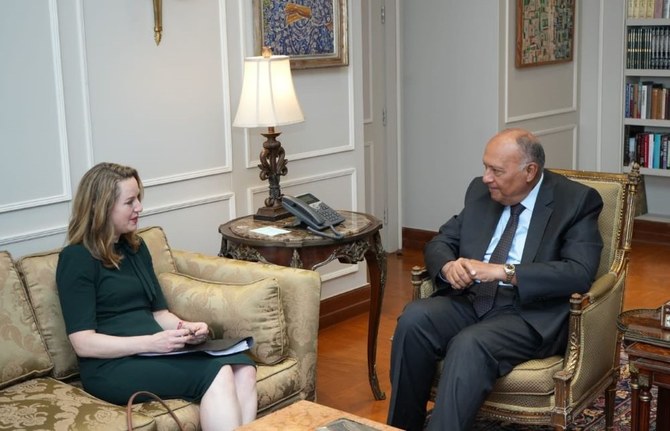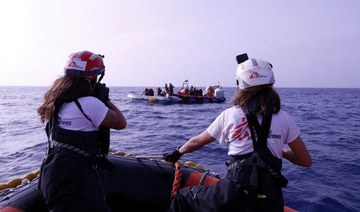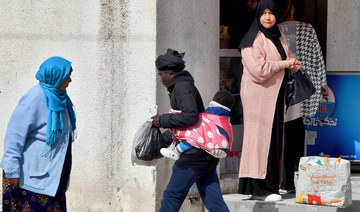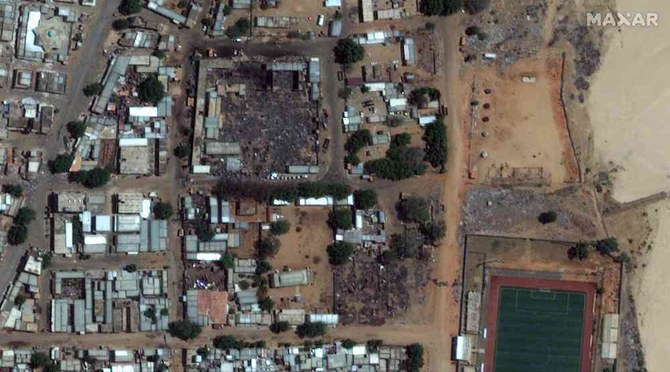DUBAI: Lebanon was plunged into a total blackout this week after two of its main power plants shut down before the army stepped in to supply fuel from its stocks. It was the latest in a series of disasters to strike the country’s public-services infrastructure in general, and the power sector in particular, in recent times.
Energy production reportedly dropped to less than 200 MW while the country requires around 3,000 MW. The blackout occurred less than a month after Electricite Du Liban, the state electricity corporation, warned that Lebanon was heading toward a “total and complete” power outage unless more fuel supplies were secured.
The collapse of electricity production also came just weeks after the energy ministers of Egypt, Jordan, Lebanon, and Syria agreed on a road map for the delivery of Egyptian natural gas to Lebanon, which, if successfully implemented, could provide the country with up to 17 hours of electricity per day.
Millions of Lebanese currently endure power outages of up to 22 hours per day as their leaders struggle to secure the foreign capital needed to import fuel. Operators of private backup generators are being pushed to their limits as costs of diesel and repairs have skyrocketed.
“We hope that the import of gas will happen as soon as possible and the cooperation between the countries is considered natural because it is not the first time that cooperation between us has taken place,” Raymond Ghajar, Lebanon’s former energy minister, said last month.
Earlier this month, after a meeting with his Egyptian counterpart Tarek El-Molla in Cairo, Ghajar said Egypt had offered extra quantities of gas. Molla hinted that a deal could be finalized “within the coming weeks.”
The plan is part of a US-coordinated effort to deliver natural gas via the Arab Gas Pipeline, which originates near Arish on Egypt’s Sinai Peninsula and extends through Jordan, Syria and into Lebanon.

Lebanon’s former Energy Minister Raymond Ghajar, Jordan’s Energy Minister Hala Zawati, Syria’s Minister of Oil and Mineral Resources Bassam Tohme and Egypt’s Minister of Oil and Mineral Resources Tarek El Mol. (Reuters)
“This is a good step in the right direction but more needs to be done,” Laury Hayatyan, MENA director at the New York-based Natural Resource Governance Institute, told Arab News, citing the need for forming technical committees from each country to monitor the pipeline’s condition.
According to Ghajar, Lebanon is in talks with the World Bank to secure financing for the import of Egyptian natural gas, which will provide the country with 450 megawatts of power.
“To produce 450 MW, Egypt has to provide Lebanon with around 1 billion cubic meters or 670,000 tons of gas,” Marc Ayoub, an energy policy researcher at the American University of Beirut’s Issam Fares Institute, told Arab News. “Egypt can probably do that given its large gas discoveries in recent years.”
The total energy production and the amount of gas needed will also depend on the efficiency of Lebanon’s power plants, he said.
Lebanon currently has a maximum power generating capacity of 2,000 MW, far less than the 2017 summer peak demand of 3,400 MW. The power generating-capacity figure is misleading, however; some 50 percent of the output is wasted due to grid inefficiencies.
The biggest challenge facing the Arab Gas Pipeline is something else, however: The state of the industrial infrastructure of each country.
Infrastructure in Syria, a country devastated by a decade-long civil war, is in urgent need of repair so that gas can reach Lebanon. Egyptian gas stopped flowing through Syria in 2010.
“They said that gas will be transported as soon as possible,” Hayatyan said. “But what exactly does this mean and how much time will it actually take to set up everything?”
Despite the US sanctions on Syria under the Caesar Syria Civilian Protection Act of 2019, which prohibits financial transactions with the country’s institutions, Washington seems to have given its tacit approval to the pipeline proposal.

Lebanon’s capital, Beirut, was pushed into a total blackout in April after its main power stations went offline due to a lack of fuel. (AFP)
“There were signals from the US ambassador to Lebanon that initiated these proceedings, but we must wait for an official confirmation from the US Treasury,” Hayatyan said.
However, the exact payment terms must be agreed on, given that each point of entry charges a transit fee for gas to pass through. “For instance, before the civil war in Syria, they used to take part of the gas transported instead of cash payments,” she said.
In the past, the gas was transported to Lebanon’s Deir Ammar power plant. However, if the arrangement is to be revived, the plant will need to be refitted, having been run on liquid fuel for many years.
If the deal eventually goes ahead, it will not be the first time Lebanon has imported gas from abroad. “We used to import gas back in 2004 when the Arab Gas Pipeline was completed,” Roudi Baroudi, an oil and gas expert, told Arab News.
“If Lebanon had fully benefited from that partnership and the Arab pipeline, most of its electricity problems would have been resolved.”
Lebanon’s government says net transfers to state power firm EDL amount to between $1 billion and $1.5 billion per year, most of which is spent on fuel oil. In 2016, the International Monetary Fund said the accumulated cost of subsidizing EDL amounted to roughly 40 percent of Lebanon’s entire national debt, which itself exceeded 150 percent of its GDP.
Had Lebanon made the most of its pipeline partnership, the state’s treasury could have saved something in the region of $5 billion over 18 years. “That is if we assume that the price of a barrel of oil ranges between $50 and $60,” Baroudi said.
Egypt, Jordan, and Syria might be willing to extend credit lines to Lebanon, at least in the short term, Baroudi said, adding that “the most important thing now is to open diplomatic channels with all these countries.”
To increase the productivity of the new pipeline supply, Baroudi said it would make sense for Lebanon to convert the rest of its power plants to run on gas. “The Zahrani, Jiyeh, and Zouk plants should be converted and connected to the grid,” he said.

“We are now counting on the international community to fund vital projects in the public and private sectors to revive economic life,” Lebanese President Michel Aoun said.
In the meantime, Lebanon is looking to purchase excess capacity from Jordan, which could supply about three hours of electricity per day. “Jordan has been producing an excess of electricity in recent years after embracing renewables and is looking to sell that to neighboring countries,” Hayatyan said.
Lebanon also struck a deal with Iraq in February to swap one million tons of Iraqi oil for derivatives that match its own power plants’ specifications.
When precisely the Lebanese people will see any benefits is unclear. Grappling with the worst financial crisis in its history, Lebanon has gradually increased fuel prices in recent months because the cash-strapped central bank can no longer afford to fund fuel imports.
The latest price hike, expected to be followed by further increases in the coming weeks, is widely seen as a prelude to a final and definite lifting of fuel subsidies by the government.
Acute fuel shortages have brought the small Mediterranean country to the brink of humanitarian disaster, with hospitals across the country struggling to provide power to ventilators and other life-sustaining equipment.
To fill a medium-sized vehicle’s tank, most Lebanese have to pay close to the monthly minimum wage of 675,000 Lebanese pounds, at a time when nearly 80 percent of the population is estimated to live below the poverty line.



